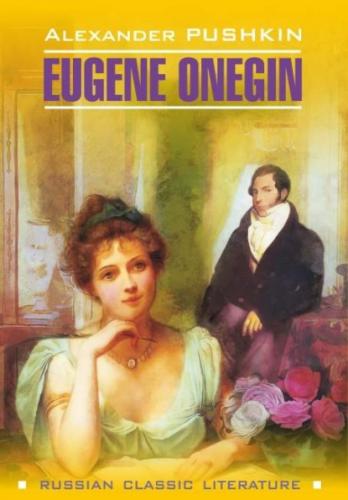All the creations which below
From happy inspiration flow,
The swain of Julia Wolmar,
Malek Adel and De Linar,[28]
Werther, rebellious martyr bold,
And that unrivalled paragon,
The sleep-compelling Grandison,
Our tender dreamer had enrolled
A single being: ’twas in fine
No other than Onegin mine.
IX
Dreaming herself the heroine
Of the romances she preferred,
Clarissa, Julia, Delphine[29], —
Tattiana through the forest erred,
And the bad book accompanies.
Upon those pages she descries
Her passion’s faithful counterpart,
Fruit of the yearnings of the heart.
She heaves a sigh and deep intent
On raptures, sorrows not her own,
She murmurs in an undertone
A letter for her hero meant:
That hero, though his merit shone,
Was certainly no Grandison.
X
Alas! my friends, the years flit by
And after them at headlong pace
The evanescent fashions fly
In motley and amusing chase.
The world is ever altering!
Farthingales, patches, were the thing,
And courtier, fop, and usurer
Would once in powdered wig appear;
Time was, the poet’s tender quill
In hopes of everlasting fame
A finished madrigal would frame
Or couplets more ingenious still;
Time was, a valiant general might
Serve who could neither read nor write.
XI
Time was, in style magniloquent
Authors replete with sacred fire
Their heroes used to represent
All that perfection could desire;
Ever by adverse fate oppressed,
Their idols they were wont to invest
With intellect, a taste refined,
And handsome countenance combined,
A heart wherein pure passion burnt;
The excited hero in a trice
Was ready for self-sacrifice,
And in the final tome we learnt,
Vice had due punishment awarded,
Virtue was with a bride rewarded.
XII
But now our minds are mystified
And Virtue acts as a narcotic,
Vice in romance is glorified
And triumphs in career erotic.
The monsters of the British Muse
Deprive our schoolgirls of repose,
The idols of their adoration
A Vampire fond of meditation,
Or Melmoth, gloomy wanderer he,
The Eternal Jew or the Corsair
Or the mysterious Sbogar.[30]
Byron’s capricious phantasy
Could in romantic mantle drape
E’en hopeless egoism’s dark shape.
XIII
My friends, what means this odd digression?
May be that I by heaven’s decrees
Shall abdicate the bard’s profession,
And shall adopt some new caprice.
Thus having braved Apollo’s rage
With humble prose I’ll fill my page
And a romance in ancient style
Shall my declining years beguile;
Nor shall my pen paint terribly
The torment born of crime unseen,
But shall depict the touching scene
Of Russian domesticity;
I will descant on love’s sweet dream,
The olden time shall be my theme.
XIV
Old people’s simple conversations
My unpretending page shall fill,
Their offspring’s innocent flirtations
By the old lime-tree or the rill,
Their Jealousy and separation
And tears of reconciliation:
Fresh cause of quarrel then I’ll find,
But finally in wedlock bind.
The passionate speeches I’ll repeat,
Accents of rapture or despair
I uttered to my lady fair
Long ago, prostrate at her feet.
Then they came easily enow,
My tongue is somewhat rusty now.
XV
Tattiana! sweet Tattiana, see!
What bitter tears with thee I shed!
Thou hast resigned thy destiny
Unto a ruthless tyrant dread.
Thou’lt suffer, dearest, but before,
Hope with her fascinating power
To dire contentment shall give birth
And thou shalt taste the joys of earth.
Thou’lt quaff love’s sweet envenomed stream,
Fantastic images shall swarm
In thy imagination warm,
Of happy meetings thou shalt dream,
And wheresoe’er thy footsteps err,
Confront thy fated torturer!
XVI
Love’s pangs Tattiana agonize.
She seeks the garden in her need —
Sudden she stops, casts down her eyes
And cares not farther to proceed;
Her bosom heaves whilst crimson hues
With sudden flush her cheeks suffuse,
Barely to draw her breath she seems,
Her eye with fire unwonted gleams.
And now ’tis night, the guardian moon
Sails her allotted course on high,
And from the misty woodland
